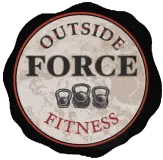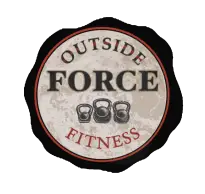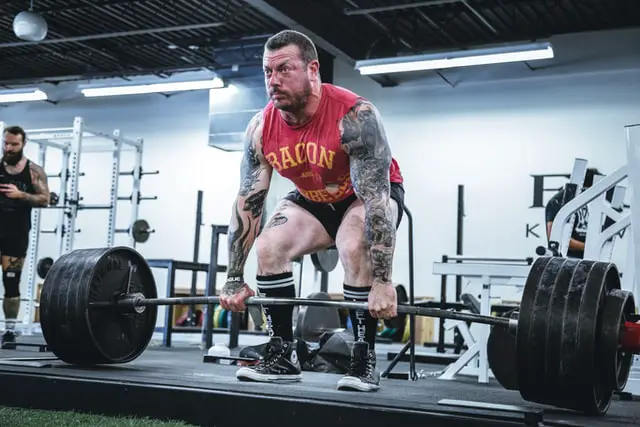I am often wary of the man who is in his 30s and walks into my gym ready to get his “old body” back. He is full of energy and fury. Ready to run his body to the brink – just like he used to. But the brink isn’t as far off as it used to be.
I would say that is the group of individuals who are most at risk for injury. In my experience, that is factually who gets injured most. A senior citizen will know and have the caution to take it easy on themselves. The man in his 30s not only doesn’t know, he is actively rejecting the thought.
Starting Exercise on a Gradient
So I tell them over and over again that I forbid them to even try to lift any serious or even moderate amount of weight at the beginning of their training. This is for several reasons.
The main reason nobody should start off lifting heavy weights is that it is pointless. For the first two weeks of any structured exercise program, your benefits come from neuromuscular changes. It is your nervous system that adapts and is able to activate your muscles more so that they can do more work.
I once read a study where a group of guys started lifting a broomstick and another group started packing it on heavy. Tests before and after showed no statistical difference between their before and after scores. They all improved – but they all improved by the same amount.
There are often reasons of reputation connected to starting hot and heavy. A person goes into a gym and in the back of their mind they are trying not to make an ass of themselves. To the trained eye, most of them do. But I help as many people as I can and I make it okay to ease back into it.
How Does a Muscle Change When Starting Exercise?
There are many parts of your muscle. The part that we are most interested in is the muscle itself. Exercise strains the muscle, creating little tears and the muscle rebuilds itself. But you aren’t just stressing the muscle, you’re stressing the tendon. Since the tendons are the connectors of muscle and bone, these guys need to be strong, too.
Your tendons strengthen as you exercise, but they don’t respond as quickly due to less blood flow. That’s why injuries to tendons take longer to heal than an injury to a muscle. The tendon looks out for itself, though. If it is stressed too much, then it will actually shut down nerve activity to the muscle to protect it. (The official term for the structure is the golgi tendon organ or golgi tendon apparatus.)
Then, depending on if you are lifting heavier weights over a few repetitions or light weights over many repetitions – your muscle can adapt in one of two ways.
Heavy weights – your muscle will tend to get bigger. You will be able to load your muscles to a much higher degree.
Light weights, lots of repetitions – your muscle may get bigger, but it will not grow as big as if you did heavy weights. Your muscle will also begin to build out a bigger web of blood vessels (capillaries) within the muscle to fuel the muscle and rid it of waste products.
Fun fact about the golgi tendon organ: Ever heard of people lifting insane amounts of weight in times of stress? Let’s say a heavy object falls on a woman’s child. There’s no way she should have been able to lift the 500-pound object, but she did because our bodies are somehow wired to override this organ. And a good amount of damage was done and I’m sure she paid for it the next days and maybe even weeks.
Skipped Gradients in Fitness and Exercise
Think of an arbitrary level of fitness between one and ten. The only way you should approach fitness training is to find out where you are (or take a good guess) and train yourself to get to the next level. If you’re at Level 2, then you should only lift the weights of a person at Level 2. Don’t jump to Level 4.
Whether we’re talking about your endurance, strength, balance, coordination or any other aspect of your body, you just need to train to get to the next level. Once you’re there, train to go to the next one. Within any given workout, act like there are no more levels past the one you are reaching for and you’ll end up winning. Once you reach that level, check it off and jump to the next. You will be happy that you are making measurable progress.
You don’t need to be a genius to set up an exercise program with objective goals. If you have trouble doing it, pay a fitness trainer $30 to sit with you and help you work out your program.
Examples of My Own Skipped Gradients
There are many times where I have taken on too much, but here are a couple times were I was definitely injured as a result of stressing a part of my body past the breaking point.
1. I joined a track class in high school because I was too cool for tennis (horrible mistake) so I figured I could run around a track instead and look much cooler. Triple jump and long jump looked cool to me and “jumper” had a cool ring to it, which was really all that mattered.
They threw me into the thick of it. Coach said to run a mile and warm up. So I ran the first mile of my life (at 15 years old) without stopping and it was everything I could do to keep from vomiting. I then proceeded to do single leg plyometric training with the seasoned jumpers. Within a couple of weeks it hurt to even walk, let alone run or jump. I was told that I had severe shin splints and was put on an ankle strengthening program. There went my track career.
2. Years later when I started up as a personal fitness trainer, I decided I wanted to run barefoot like the Tarahumara. These Vibram FiveFinger shoes-that-weren’t-shoes came out and I was lit up. I was convinced that shoes were a complete arbitrary since we all evolved unshod and I needed to return to my roots.
So I started running on the concrete. Smart, huh? It really hit my lower calves (soleus muscle) and I was amazed at the muscles I never knew I had! So I kept doing and soon enough I had massive shin splints and a serious pain on the ball of my foot. It took months before I could even run normally with shoes. I may have succeeded at my goal of running a marathon in those things if I kept to a gradient.
What Does It Mean to Over Train?
This is a subject somewhat related to the immune system. Your body repairs the torn muscles after exercise and the resources that handle this are referred to as the immune system. If you keep damaging your muscle tissue, stressing ligaments, bones, tendons, etc., then you have to allow yourself time to rest so it rebuilds. Remember: you build muscle outside of the gym. The gym is just the stimulus.
You can absolutely train hard on a well thought out program. But if you aren’t getting proper nutrition or if you aren’t sleeping, then your body can’t repair itself.
Symptoms of this are elevated resting heart rate, fever, discomfort, fatigue, trouble sleeping and they go on even to affect you emotionally. You just need to let your body heal itself and then you’ll get better.
A runner can over train by increasing their weekly mileage too fast.
A bodybuilder can over train by training for longer hours or not allowing enough rest time between workouts.
A CrossFitter can over train by doing two workouts a day and sleeping less than 6 hours every night. (I’m guilty of this one)
Overtrained Athletes
You may be an athlete or you may train athletes.
They are a rowdy bunch – and thank God they are! But this well of energy sometimes gets spread over into extra-curricular activities that eat up their sleep time. You may have a perfectly good athlete who starts to show signs of overtraining and they give you all sorts of reasons why they aren’t doing well.
Some of the most notable symptoms may be disinterest (disguised with a pile of excuses). Your biggest flashing alarm bell should go off at this point. It is often an indicator of a bigger problem.
A bad day here and there is no cause for real alarm. We improve on a jagged line upwards and it may just be a temporary dip. If you’ve got your pulse on all parts of the athlete’s life, then you can spot what needs to change. If you’ve got a magic touch when it comes to talking to people, they may confess to you what is going on (whatever it is).
Most of the time there is a simple solution to this – go to sleep. It is very often overlooked. In my experience, athletes are the most likely people to over train themselves. Anorexic individuals probably come second.
Conclusion
You have now learned:
- How to train your body on the proper gradient
- How to overload a specific part of your body
- How to overload your entire body
I’m not here to make your decision for you and this isn’t specific advice since I don’t know your body. These are just some things you can think with when training yourself.



